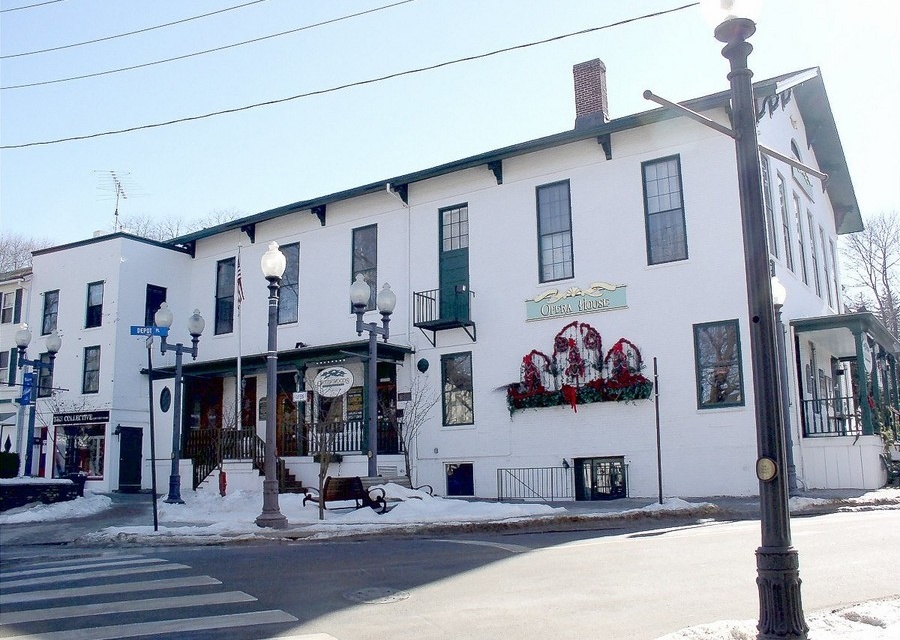The Opera House in Bethel, Connecticut: “The American reality beneath the Trumpland veneer”
Trumpland America is an America divided. Its electorate is a simple binary of regime collaborators and resistance members.
It was with trepidation that I travelled across the Atlantic to visit this Trumpland in the summer. I had read about a country that had been engulfed by a rage, that had lost its supposed generosity. A destitute America, having closed its borders to the forsaken.
In the white heat before the midterm elections, I expected tension on the journey north from New Jersey. In my Republican destination of Bethel, Connecticut, I anticipated a town of white xenophobes.
The colonial buildings and the picket fences fit the American stereotype, as did the stretch of yards occupied by pickups. This would be another rural town demanding retribution for grievances. Supported rather than targeted by a Washington administration, it was at last reclaiming its identity.
But this fabric began to tear, the canvas peeling at the edges. One conversation after another brought the American reality beneath the Trumpland veneer. The estate at the top of town did not have a guard fearful of the invasion of illegals. The owner did not demand the President restore security against the threat of rapists, terrorists, and killers. The migrants which concerned her were the geese flying against the storms battering the coastline.
She was older, fairly affluent, supportive of the 2nd Amendment, and a registered Republican. But she was conscientious and open to challenging opinions until — at the end of the discussion — she explained she had helped elect the President two years ago. Republicans vote Republican.
The former selectman, a two-term mayor, Republican. Naturally, he too admired the President, but he had an appreciation of politics that was subtler than backward conservative fending off progressive liberal. His was a political belief with a nuanced conception of liberty, republicanism, and environmentalism. I had not expected the Republican arguing for environmental preservation, the contrast to Trumpland’s denizen looking to destroy the planet with coal, fire, and fracking.
A City at the Heart of Resistance?
In New York, I was struck by the the sense of vibrancy, excitement, the noise. The city resonates power and ambition, dramatizing the mundane.
The hotel was a townhouse on Lexington Avenue, four stories of brick squeezed between two aluminum skyrises.
Sweltering in the humidity after clambering up the carpeted staircase, weighed down by bagels and cheesecake, I sat in the lounge and dwelled on the contrast between the simplistic and fantastical Trumpland and the banal and intricate of the US I was seeing.
Trumpland is an easy retreat into the simple of the globalising liberal v. the isolationist conservative. Rather than understand the complexity of American society, depict it in black and white. Rural and urban. Republican and Democrat.
The taxi driver noted the past year of commentary. But for all the columns and opinion pieces, he could hardly care about the details of the impeachment process. The American jazz scene was of far more interest, and music rather than Capitol Hill occupied our discussion for the remainder of the journey.
A similar conversation with the Air Force veteran staying in my hotel. He wasn’t particularly bothered by politics. Instead we talked about his stories, the places he has yet to visit, and above all, the beauty of the Blue Ridge Mountains. Hardly an ignorant xenophobe. He was a traveller, albeit an aging one, with a wider worldview than the narrow vision of Trumpland.
As I ate a reuben sandwich in the diner above Liberty Park, it wasn’t the White House that dominated
conversation, even if its occupant dominated the TV screen above the counter. It was the daily affairs of life, from work colleagues to football. No fracturing here.
In Times Square, a security guard talked to me about pickpockets and muggings. It was refrain of every conversation where I was warned against crime in the city. But there was no knife edge of partisanship, from drivers to veterans. In this place outside Trumpland, the local concerns of crime, litter, and housing, the arguments broke out over how the yard was kept.
Trumpland’s Virus
The electorate is largely unconcerned with political complexities. Provided the traffic can flow and the
internet remains accessible, people are content to leave the court intrigue and state conspiracies to the media
columnists. The misleading depiction of Trump voters as a seething mass of racists is as deceptive as labeling every Democrat as out of touch. The abstract of individual perceptions is the landscape here, not the dominant narratives.
But if the portrayal of jingoist fear of immigration is a totalizing explanation, one that fails to reflect American reality, Trumpland’s fantastic narrative is still infecting society.
If I did not find Trumpland in my conversations, I walked into it every time the TV was turned on. The daily of the geese and the jazz music had been overrun by the spectacle of battle between two opposing armies.
Trumpland is a dream/nightmare imagined by the media, reducing America to the extreme. The many motives, concerns, and narratives of the occupants have been ignored in favor of the pleasing simplification of valiant good v. pernicious evil. And, finally, after the incessant broadcast beat, fantasy becoming reality.
Finally, America will be torn in half — the friendly arguments over the yards, the jazz, the beauty of the Blue Ridge all overtaken by the broadcast of division.

